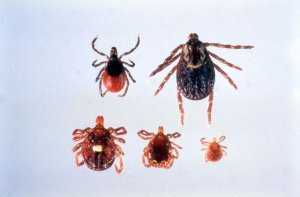
“Ramblers, campers, mountain bikers, and others who work and walk in forested or grassy areas must be vigilant against tick bites”, says Dr. Paul McKeown, Specialist in Public Health Medicine. Lyme disease can, in a small number of cases, cause severe debilitating heart and nervous system disease.
“Ticks are tiny spider like creatures that feed on the blood of mammals and birds and will also feed on the blood of humans and occasionally dogs. Ticks are more numerous and more active in the summer months and protecting against tick bites protects against Lyme disease. The most effective way to prevent Lyme disease is by preventing tick bites” continued Dr. Mckeown.
Tick bites can be prevented by:
· Wearing long trousers, long sleeved shirt and shoes
· Using an insect repellent, such as DEET (but use a low-strength DEET if you are pregnant – your local pharmacist can advise you)
· Checking skin, hair and warm skin folds (especially the neck and scalp of children) for ticks, after a day out
· Removing any ticks and consulting with a GP if symptoms develop
· If you have been walking your dog, check him/her too
If you find a tick, remove it – consult your GP if symptoms develop. Information on how to remove ticks is available on the HPSC website. Only a minority of ticks carry infection. Ticks generally have to be attached to a person for a number of hours before passing on the infection, so rapid removal of ticks is important. If a tick is removed within a few hours, the risk of infection is low. The entire tick, including any mouthparts which might break off, should be removed with a tweezers by gripping it close to the skin. The skin where the tick was found should then be washed with soap and water and the area checked over the next few weeks for swelling or redness.
When infected many people have no symptoms at all. In Europe, between 5% and 25% of the population (depending on which country you are in) have antibodies in their blood to Lyme disease, meaning they have been bitten by an infected tick at some stage in their lives. When a tick bites a person to have a blood feed, about ¾ of people develop a skin rash, known as erythema migrans. This rash generally develops between 3 days and a month after a tick bite. The rash can be visible for up to a month and may grow to be several inches in diameter. People, who have been infected, can also develop flu-like symptoms such as headache, sore throat, neck stiffness, fever, muscle aches and general fatigue; full recovery is generally the rule.
Occasionally however, there may be much more serious complications involving the nervous system, joints, the heart or other organs. Anyone who develops a rash or other symptoms should visit their GP and explain that they have been bitten by a tick. Lyme disease is generally diagnosed by medical history and physical examination. Diagnosis can be difficult if there has been no rash. The infection can be confirmed by special blood tests.
“Lyme disease has been notifiable in Ireland since 2012 and since then, there have been between eight and 18 cases notified in Ireland each year. However, as many people will not be aware that they are/have been infected or may not seek medical help when unwell, the true incidence of Lyme disease is not accurately known. It is likely that there are at least 50 -100 cases in Ireland every year,” added Dr. McKeown.
Further important information to protect against Lyme disease is available on the HPSC website: http://www.hpsc.ie/A-Z/Vectorborne/LymeDisease/






